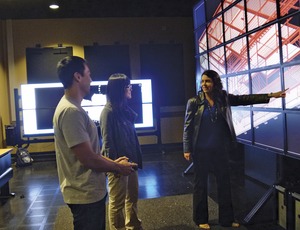
Fernanda Leite has a passion for teaching and technology. A tenure-track assistant professor at the University of Texas at Austin, she clearly delights in the research her graduate students are doing. Third-year Ph.D. student Li Wang, for example, is capturing decisions made by experts while resolving clashes detected in building information models to help train novice designers in the future.
"We developed a plug-in that works with Autodesk Navisworks to link comments directly to 3D elements so that, later, we can pull the information and learn from it," says Wang. Leite adds, "If we can learn how experts make decisions and put all those decisions in a database, then we can use machine-learning algorithms to suggest new decisions based on hundreds or thousands made in the past." The researchers use UT's Visualization Laboratory for design coordination meetings, so contractors can see 3D models at a larger scale.
 |
In the department of civil, architectural and environmental engineering, Leite teaches an undergrad course in project management and economics and a graduate course in building information modeling for capital projects, mentors graduate students, works on her own research projects, writes proposals for new grants and contracts, and works on university and professional committees.
 |
| Leite |
"Fernanda is unique because she has optimism and sees new opportunities," says Prof. Sharon L. Wood, department chair. "When she comes to my office, it's because she has an idea for teaching a new course or collaborating with another department."
Leite's own current research, recognized this year by FIATECH with its Celebration of Engineering & Technology Innovation Award for outstanding early career researcher, involves prevention of backing fatalities in construction work zones for the Texas Dept. of Transportation and the true impact of late deliverables at construction sites for the Construction Industry Institute and the Construction Users Roundtable, among other research projects.
She sometimes finds time for lunch at São Paolo's, a Brazilian restaurant near campus, and vouches for its authentic cuisine. Born in Recife in northeastern Brazil, Leite, 34, followed in both her father's and grandfather's footsteps: Her father was a research scientist who brought his family with him while earning advanced degrees at Texas A&M. Her grandfather was a housing developer, a self-made businessman who took young Fernanda to visit construction sites and sparked her early interest in engineering. She met her husband, Daniel Oliveira, while studying architecture and urban planning at the Federal University of Ceara, Brazil, and both won fellowships to Carnegie Mellon University for doctoral degrees.
What's ahead? Using the soon-to-be-constructed $310-million Engineering Education Research Center at UT as a test bed, Leite plans to apply for a National Science Foundation grant to continue Wang's research. She says, "We hope to formalize expert design and construction knowledge in a computer-interpretable manner and leverage machine-learning approaches."


















Post a comment to this article
Report Abusive Comment